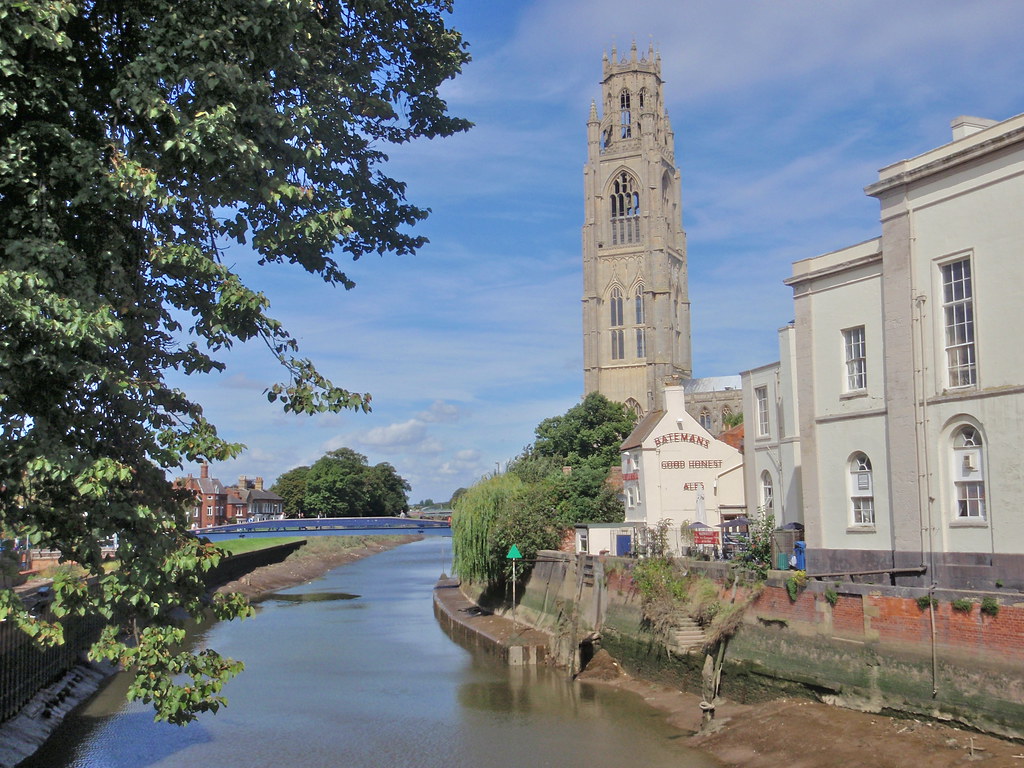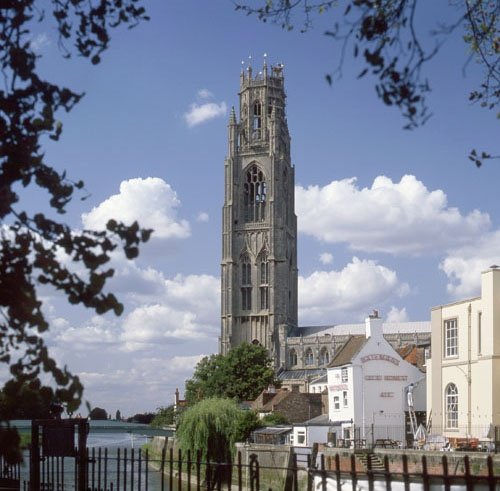Boston (Lincolnshire)
Boston is a town in the English county of Lincolnshire and the administrative seat of the homonymous borough of Boston. She had in 2001, according to census a total of 35 124 inhabitants.
Geography
Boston is located on the North Sea coast near the mouth of the Witham in the Tidal Basin The Wash. The next largest cities are within Peterborough (50 km south) and Lincoln (55 km north-west ).
History
On one of the few islands in the marshy subsoil fixed marshland of the Fens, a monastery was founded in the year 650. After collection of the Norman conquerors, the port developed until the 14th century in England's main port for the wool and cloth exports to Europe.
Boston served in the Middle Ages as an important port for trade with continental Europe. It was the site of a trading post of the Hanseatic League and was as such the London office temporarily Steelyard. The ancient port city was the second most important port of the British kingdom and maintained extensive trade relations with the Hanseatic cities.
1607 From here started the Pilgrims their vain attempt to Holland and thus to achieve religious freedom. Some of the Pilgrim Fathers, with the ship Mayflower in 1620 emigrated to America and in 1630 the new city of Boston founded, came from the English Boston or had been detained here. Your prison cells are still preserved.
Tourism
The most important attraction of the town is the parish church of Saint Botolph, was completed with the famous Boston Stump, a church steeple, started its foundation in 1309 and 1460. It is 83 meters high and dominates the landscape within the city. Previously, he served as a beacon for ships and for the travelers through the Fens.
In the 19th and 20th centuries, the church was restored with donations from citizens of the U.S. Boston.
Other attractions include the seven-story, five -bladed windmill Maud Foster (English Maud Foster Mill ) of 1819, England's highest grindable windmill and last of the more than twenty mills in place on the rim of the Maud Foster channel (English Maud Foster drain ), a the main drainage channels, and the guild Hall (Boston Guildhall ), a brick building constructed in 1450 in which the City Museum is housed.
Boston Stump
Windmill Maud Foster
Tidal influence
Traffic
Boston is located on the A roads A16 ( Grimsby - Stamford ) and A52 ( Mablethorpe Newcastle -under- Lyme). In Peterborough there with the A1 ( M) connection to the road network.
The Boston station located on the Poacher Line of Grantham Skegness, which is operated by East Midlands Trains. It was also Boston endpoint of the East Lincolnshire Line, which led over Louth to Grimsby, 1970, however, the Beeching Axe fell victim.
Born in Boston personalities
- John Foxe (1517-1587), writer
- Anthony Ascham ( 1614/18-1650 ), noble, parliamentarian and diplomat
- John R. Jewitt (1783-1821), gunsmith, writer, sailor, actor and singer
- James Richardson (1809-1851), missionary, abolitionist and explorer of Africa
- Jean Ingelow (1820-1897), poet
- John Westland Marston (1820-1890), writer
- Jim Clark ( born 1931 ), editor and director
- Peter Brotherton ( born 1931 ), cyclist
- Victor Emery (1934-2002), theoretical solid state physicists
- Alan Moulder ( born 1959 ), sound engineer and music producer
- Ben Pridmore (* 1976), memory athletes
- John Oster (born 1978 ), Welsh football player
- Melanie Marshall ( b. 1982 ), swimmer










